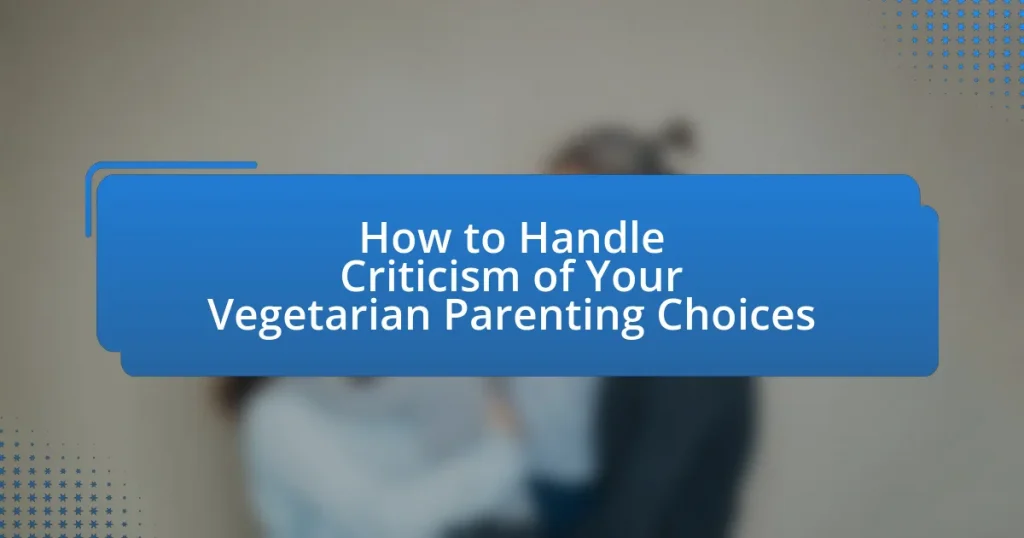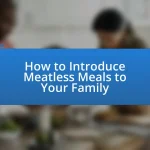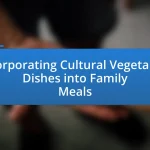The article addresses the common criticisms faced by parents who choose vegetarian diets for their children, focusing on concerns about nutritional adequacy, social isolation, and the imposition of dietary restrictions. It explores misconceptions surrounding vegetarian nutrition, the influence of cultural beliefs, and the health implications raised by critics, including potential deficiencies in essential nutrients. Additionally, the article provides strategies for vegetarian parents to effectively respond to criticism, educate others about their dietary choices, and foster a supportive environment for their children. Resources and best practices for maintaining a positive vegetarian lifestyle at home are also discussed, emphasizing the importance of community support and active involvement in meal planning.
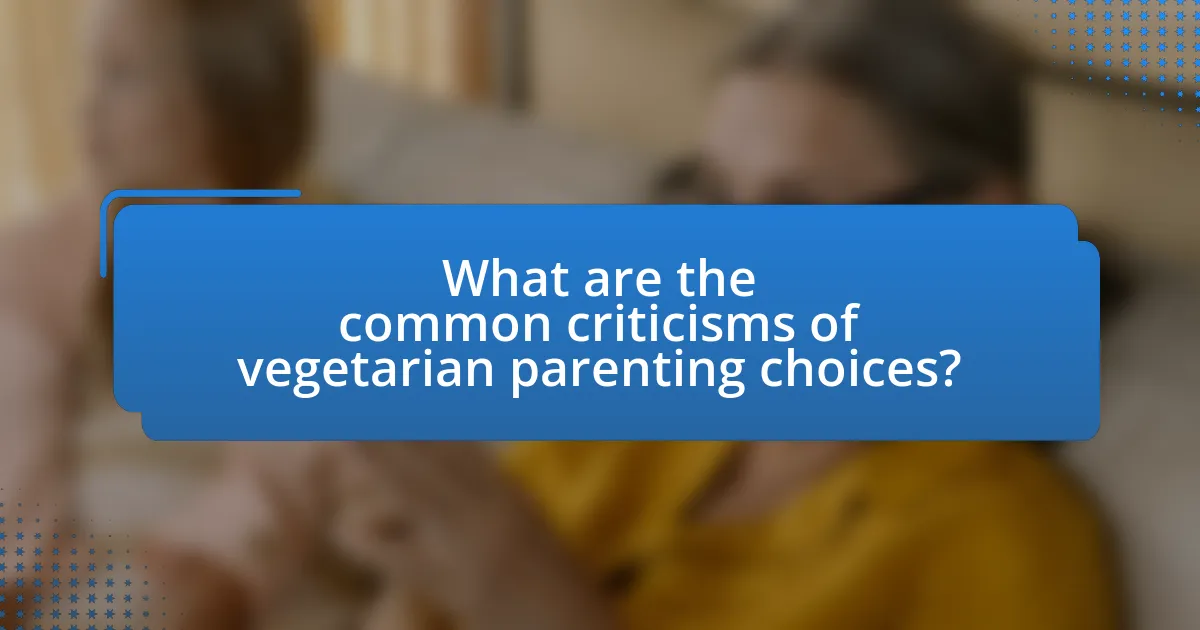
What are the common criticisms of vegetarian parenting choices?
Common criticisms of vegetarian parenting choices include concerns about nutritional adequacy, potential social isolation, and the belief that it imposes dietary restrictions on children. Critics argue that a vegetarian diet may lack essential nutrients such as protein, iron, and vitamin B12, which are typically found in animal products. Research indicates that children on vegetarian diets can meet their nutritional needs if properly planned, but critics often highlight the risk of deficiencies. Additionally, some believe that vegetarian children may face social challenges, such as difficulty eating at friends’ houses or during school events, which can lead to feelings of exclusion. Lastly, opponents argue that parents should allow children to make their own dietary choices rather than imposing a vegetarian lifestyle, suggesting that it may limit their exposure to diverse foods.
Why do some people criticize vegetarian parenting?
Some people criticize vegetarian parenting due to concerns about nutritional adequacy for children. Critics argue that a vegetarian diet may lack essential nutrients such as protein, iron, and vitamin B12, which are crucial for a child’s growth and development. Research indicates that children on vegetarian diets can meet their nutritional needs, but critics often highlight studies showing potential deficiencies if diets are not well-planned. For instance, a study published in the Journal of the American Dietetic Association emphasizes the importance of careful dietary planning to ensure that vegetarian children receive all necessary nutrients.
What misconceptions exist about vegetarian diets for children?
One misconception about vegetarian diets for children is that they do not provide adequate nutrition. This belief is incorrect, as numerous studies indicate that well-planned vegetarian diets can meet the nutritional needs of children. For instance, the American Dietetic Association states that appropriately planned vegetarian diets are healthful, nutritionally adequate, and may provide health benefits in the prevention and treatment of certain diseases. Another misconception is that children on vegetarian diets will not get enough protein; however, plant-based sources such as legumes, nuts, and whole grains can supply sufficient protein. Additionally, there is a belief that vegetarian diets lead to deficiencies in essential nutrients like iron and vitamin B12, but with careful meal planning, these nutrients can be obtained from fortified foods and supplements.
How do cultural beliefs influence criticism of vegetarian parenting?
Cultural beliefs significantly influence criticism of vegetarian parenting by shaping perceptions of dietary norms and child-rearing practices. In cultures where meat consumption is a traditional staple, vegetarian parenting may be viewed as unconventional or even harmful, leading to concerns about nutritional adequacy and social acceptance. For instance, studies indicate that in societies with strong meat-centric culinary traditions, parents who choose vegetarianism for their children often face scrutiny regarding the potential impact on their children’s health and social integration. This criticism is rooted in the belief that a meat-inclusive diet is essential for proper growth and development, reflecting broader societal values around food and family.
What are the health concerns raised by critics?
Critics raise several health concerns regarding vegetarian parenting, primarily focusing on potential nutrient deficiencies. These concerns include inadequate intake of protein, iron, calcium, vitamin B12, and omega-3 fatty acids, which are essential for children’s growth and development. Research indicates that children on vegetarian diets may be at risk for anemia due to lower iron levels, as plant-based iron is less readily absorbed by the body compared to iron from animal sources. Additionally, a study published in the Journal of the American Dietetic Association highlights that vegetarian children may have lower levels of vitamin B12, which is crucial for neurological function and is primarily found in animal products.
How do critics perceive nutritional deficiencies in vegetarian diets?
Critics perceive nutritional deficiencies in vegetarian diets as a significant concern, often citing potential shortfalls in essential nutrients such as protein, iron, vitamin B12, and omega-3 fatty acids. Research indicates that individuals following vegetarian diets may be at risk for these deficiencies if they do not carefully plan their meals. For instance, a study published in the American Journal of Clinical Nutrition highlights that vegetarians often have lower levels of vitamin B12, which is primarily found in animal products, leading to potential health issues if not supplemented or obtained through fortified foods.
What evidence supports or refutes these health concerns?
Evidence supporting health concerns regarding vegetarian parenting includes studies indicating potential nutrient deficiencies, particularly in vitamin B12, iron, and omega-3 fatty acids, which are crucial for child development. For instance, a study published in the American Journal of Clinical Nutrition by Craig and Mangels (2009) highlights that children on vegetarian diets may be at risk for these deficiencies if not properly managed. Conversely, evidence refuting these health concerns can be found in research demonstrating that well-planned vegetarian diets can provide adequate nutrition for children. The Academy of Nutrition and Dietetics states that appropriately planned vegetarian diets are healthful and nutritionally adequate for all stages of life, including childhood. This indicates that with careful dietary planning, vegetarian parenting can meet children’s nutritional needs effectively.
How do critics view the ethical implications of vegetarian parenting?
Critics often view the ethical implications of vegetarian parenting as complex and multifaceted. They argue that raising children on a vegetarian diet can limit their nutritional intake, potentially leading to deficiencies in essential nutrients such as protein, iron, and vitamin B12. Research published in the Journal of the American Dietetic Association indicates that while a well-planned vegetarian diet can meet the nutritional needs of children, critics emphasize the importance of careful dietary management to avoid health risks. Additionally, some critics contend that vegetarian parenting may impose adult ethical beliefs on children, potentially stifling their ability to make independent food choices in the future. This perspective highlights concerns about autonomy and the potential for conflict between parental values and children’s preferences.
What arguments do critics make regarding animal welfare?
Critics argue that animal welfare is compromised in various industries, particularly in factory farming, where animals are often kept in cramped conditions, leading to physical and psychological distress. They highlight that these practices violate the basic needs of animals for space, social interaction, and natural behaviors. Additionally, critics point to the ethical implications of using animals for food, emphasizing that sentient beings should not suffer for human consumption. Research from the Humane Society International indicates that intensive farming methods can lead to significant suffering, as animals are often subjected to painful procedures without anesthesia.
How do critics perceive the environmental impact of vegetarian diets?
Critics often perceive the environmental impact of vegetarian diets as mixed, highlighting both benefits and drawbacks. While many argue that vegetarian diets reduce greenhouse gas emissions and land use compared to meat-based diets, some critics point out that certain plant-based foods can also have significant environmental footprints, particularly when considering factors like transportation and agricultural practices. For instance, a study published in the journal “Nature” indicates that while vegetarian diets can lower carbon emissions by up to 50%, the environmental impact varies widely depending on the types of vegetables and grains consumed. Thus, critics emphasize the importance of sustainable sourcing and local consumption to truly maximize the environmental benefits of vegetarianism.
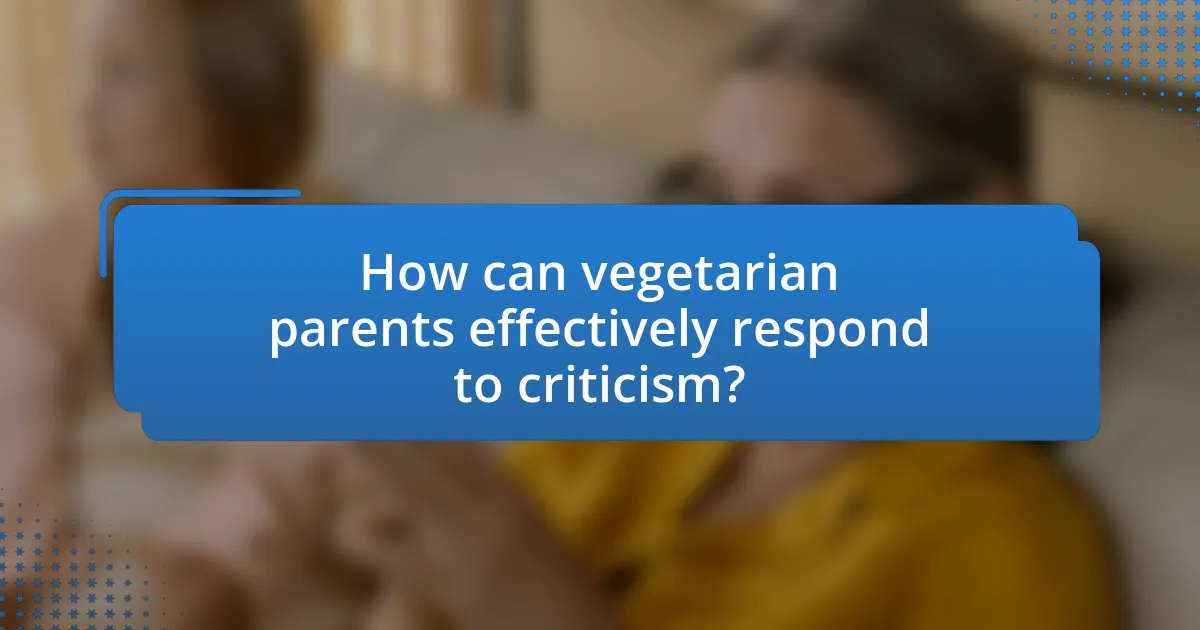
How can vegetarian parents effectively respond to criticism?
Vegetarian parents can effectively respond to criticism by calmly explaining their dietary choices and the benefits associated with them. This approach allows parents to share factual information about vegetarianism, such as its positive impact on health, the environment, and animal welfare. For instance, studies show that a vegetarian diet can reduce the risk of chronic diseases like heart disease and diabetes, as reported by the American Heart Association. By providing this context, vegetarian parents can foster understanding and respect for their choices, rather than engaging in defensive arguments.
What strategies can parents use to address misconceptions?
Parents can address misconceptions about vegetarian parenting by providing clear, factual information about nutrition and the benefits of a vegetarian diet. For instance, they can share research that demonstrates how a well-planned vegetarian diet can meet all nutritional needs, such as the study published in the Journal of the American Dietetic Association, which states that vegetarian diets can provide adequate protein, vitamins, and minerals. Additionally, parents can engage in open discussions with critics, encouraging questions and providing evidence-based answers to dispel myths. By sharing personal experiences and success stories, parents can further illustrate the positive impacts of vegetarianism on their family’s health and well-being.
How can parents educate others about vegetarian nutrition?
Parents can educate others about vegetarian nutrition by sharing accurate information and resources on plant-based diets. They can provide facts about the nutritional benefits of vegetarianism, such as lower risks of chronic diseases and improved overall health, supported by studies like the one published in the Journal of the American Dietetic Association, which indicates that well-planned vegetarian diets are nutritionally adequate and may offer health benefits in the prevention and treatment of certain diseases. Additionally, parents can organize workshops, distribute literature, and engage in discussions to dispel myths and answer questions about vegetarian nutrition, fostering a better understanding among peers and family members.
What resources are available to support vegetarian parenting?
Numerous resources are available to support vegetarian parenting, including books, online communities, and nutritional guidelines. Books such as “The Vegetarian Baby” by Sharon Palmer provide practical advice on nutrition and meal planning for vegetarian children. Online platforms like the Vegetarian Resource Group offer extensive resources, including recipes and nutritional information tailored for families. Additionally, organizations such as the Academy of Nutrition and Dietetics provide guidelines on vegetarian diets for children, ensuring that parents have access to credible information on maintaining balanced nutrition. These resources collectively empower vegetarian parents to make informed choices and address any criticism they may encounter.
How can parents maintain confidence in their choices?
Parents can maintain confidence in their choices by educating themselves about vegetarian nutrition and understanding its benefits for their children. Research indicates that a well-planned vegetarian diet can provide all necessary nutrients for children, supporting healthy growth and development. For instance, the American Dietetic Association states that appropriately planned vegetarian diets are healthful, nutritionally adequate, and may provide health benefits in the prevention and treatment of certain diseases. By staying informed and connecting with other vegetarian families, parents can reinforce their decisions and feel more secure in their parenting choices.
What role does community support play in vegetarian parenting?
Community support plays a crucial role in vegetarian parenting by providing emotional encouragement, resources, and shared experiences that help parents navigate dietary choices. This support network can include family, friends, and local or online vegetarian communities, which offer practical advice, recipes, and a sense of belonging. Research indicates that social support positively influences dietary adherence; for instance, a study published in the Journal of Nutrition Education and Behavior found that individuals with strong social networks are more likely to maintain healthy eating habits. Thus, community support not only reinforces vegetarian parenting choices but also mitigates criticism by fostering a collective understanding and acceptance of these dietary practices.
How can parents practice self-care amidst criticism?
Parents can practice self-care amidst criticism by establishing boundaries, seeking support, and prioritizing their well-being. Setting boundaries allows parents to limit exposure to negative comments, which can reduce stress and enhance mental health. Seeking support from like-minded individuals or communities can provide encouragement and validation, reinforcing their parenting choices. Prioritizing well-being through activities such as exercise, mindfulness, or hobbies can help parents recharge and maintain resilience against external criticism. Research indicates that social support and self-care practices significantly improve mental health outcomes, making these strategies effective for parents facing criticism.
What are some effective communication techniques for handling criticism?
Effective communication techniques for handling criticism include active listening, maintaining a calm demeanor, and responding constructively. Active listening involves fully concentrating on the critic’s words, which helps in understanding their perspective and shows respect. Maintaining a calm demeanor prevents escalation and allows for a more rational discussion. Responding constructively means acknowledging valid points and expressing your viewpoint without defensiveness. Research indicates that individuals who employ these techniques are more likely to foster positive interactions and resolve conflicts effectively, as demonstrated in studies on conflict resolution and communication strategies.
How can parents engage in constructive conversations about their choices?
Parents can engage in constructive conversations about their choices by actively listening to others’ perspectives and clearly articulating their own reasoning. Active listening involves giving full attention to the speaker, acknowledging their feelings, and asking clarifying questions, which fosters an open dialogue. Clear articulation of reasoning includes explaining the benefits of vegetarianism, such as health advantages supported by studies indicating lower risks of chronic diseases among vegetarians. This approach not only promotes understanding but also encourages respectful exchanges, allowing parents to address concerns while reinforcing their commitment to their choices.
What are the benefits of sharing personal experiences with critics?
Sharing personal experiences with critics can foster understanding and create a constructive dialogue. By articulating personal stories, individuals can humanize their choices, making it easier for critics to relate and empathize. This approach can lead to reduced hostility and increased openness, as evidenced by studies showing that personal narratives can effectively bridge gaps in communication and understanding. For instance, research published in the Journal of Communication found that storytelling can enhance persuasion and foster connection, demonstrating the power of personal experiences in addressing criticism.
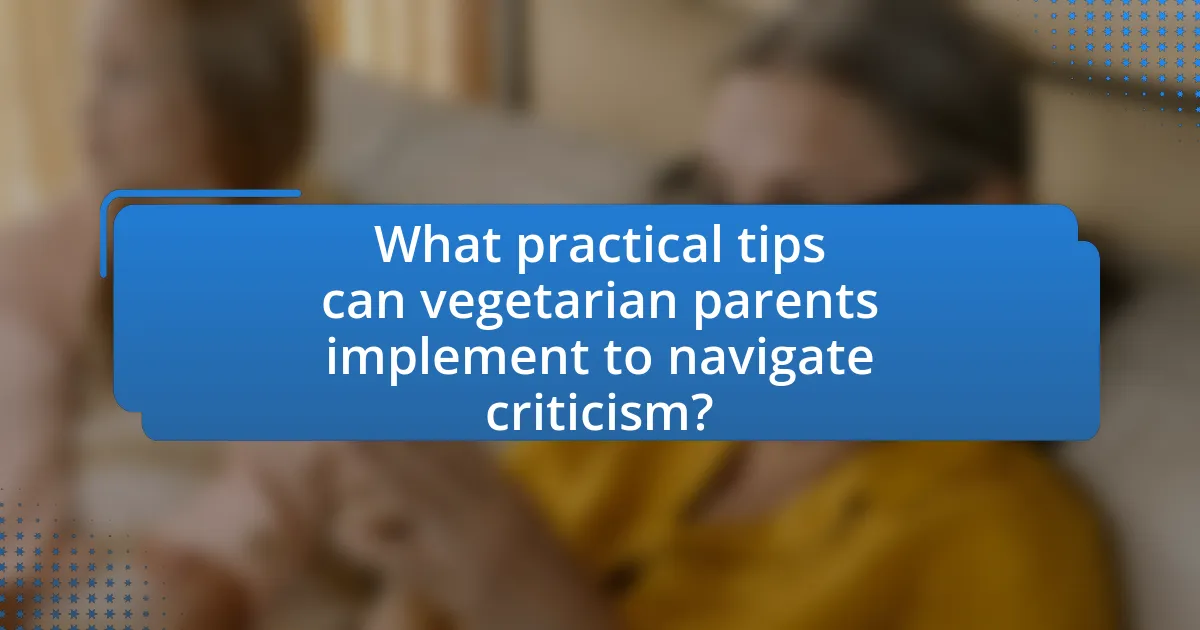
What practical tips can vegetarian parents implement to navigate criticism?
Vegetarian parents can navigate criticism by maintaining open communication, educating others about their dietary choices, and focusing on the health benefits of a vegetarian diet. Open communication allows parents to express their reasons for choosing vegetarianism, fostering understanding. Educating others can involve sharing resources or studies that highlight the nutritional adequacy of vegetarian diets, such as the Academy of Nutrition and Dietetics’ position statement, which confirms that well-planned vegetarian diets are healthful and nutritionally adequate for all life stages. Focusing on health benefits, such as lower risks of chronic diseases, can help shift the conversation towards positive aspects rather than criticism.
How can parents prepare for potential criticism in social settings?
Parents can prepare for potential criticism in social settings by developing a clear understanding of their vegetarian parenting choices and practicing effective communication strategies. By educating themselves on the nutritional benefits of a vegetarian diet and being ready to explain their reasons—such as health, environmental concerns, or ethical beliefs—parents can confidently address questions or criticisms. Research indicates that informed parents are better equipped to handle social scrutiny, as they can provide factual responses that reinforce their decisions. Additionally, role-playing potential scenarios with supportive friends or family can help parents practice their responses, making them more comfortable when faced with criticism in real situations.
What are some conversation starters to ease discussions about vegetarianism?
Some effective conversation starters to ease discussions about vegetarianism include asking about favorite plant-based meals, inquiring about the benefits of vegetarian diets, or discussing the environmental impact of meat consumption. For instance, asking, “What’s your favorite vegetarian dish?” invites sharing personal experiences and preferences, making the conversation more relatable. Additionally, mentioning studies that highlight the health benefits of vegetarianism, such as reduced risk of chronic diseases, can provide a factual basis for the discussion. Engaging in topics like local vegetarian restaurants or recipes can also create a comfortable atmosphere for dialogue.
How can parents set boundaries with critics while remaining respectful?
Parents can set boundaries with critics by clearly communicating their values and expectations while maintaining a respectful tone. For instance, when faced with criticism about their vegetarian parenting choices, parents can respond by stating their commitment to a vegetarian lifestyle for health, ethical, or environmental reasons, and express that they appreciate differing opinions but prefer to focus on their family’s choices. This approach not only establishes a boundary but also fosters a respectful dialogue. Research indicates that effective communication strategies, such as using “I” statements and active listening, can help in managing criticism while preserving relationships.
What resources can parents utilize for support and information?
Parents can utilize various resources for support and information regarding vegetarian parenting choices, including online forums, parenting websites, and local community groups. Online forums such as VeggieBoards and Reddit’s vegetarian parenting community provide platforms for parents to share experiences and seek advice. Parenting websites like The Vegetarian Resource Group offer articles, recipes, and nutritional guidelines specifically tailored for vegetarian families. Additionally, local community groups or meetups can connect parents with others who share similar dietary practices, fostering a supportive environment. These resources collectively help parents navigate challenges and gain insights into vegetarian parenting.
What books or websites provide valuable insights on vegetarian parenting?
Books such as “The Vegetarian Family Cookbook” by Cathe Olson and “Raising Vegetarian Children” by Jenna Helwig provide valuable insights on vegetarian parenting. These books offer practical recipes and nutritional guidance tailored for families. Websites like Vegetarian Times and the American Dietetic Association also serve as excellent resources, providing articles and tips on vegetarian nutrition for children, ensuring that parents can make informed dietary choices.
How can parents connect with local vegetarian or parenting groups?
Parents can connect with local vegetarian or parenting groups by utilizing social media platforms, community bulletin boards, and local health food stores. Social media platforms like Facebook often have groups dedicated to vegetarian lifestyles and parenting, allowing parents to join discussions and meet others with similar interests. Community bulletin boards in libraries or community centers frequently post information about local meetups or events related to vegetarianism and parenting. Additionally, health food stores often host events or have flyers for local groups, providing another avenue for parents to connect with like-minded individuals.
What are some best practices for fostering a positive vegetarian environment at home?
To foster a positive vegetarian environment at home, prioritize open communication about dietary choices and involve all family members in meal planning. Engaging everyone in discussions about the benefits of vegetarianism, such as health improvements and environmental impact, can create a supportive atmosphere. Research indicates that families who share meals together and discuss food choices tend to have stronger relationships and better adherence to dietary practices. Additionally, providing a variety of appealing vegetarian options and encouraging experimentation with new recipes can enhance acceptance and enjoyment of vegetarian meals.
How can parents involve children in meal planning and preparation?
Parents can involve children in meal planning and preparation by encouraging them to choose recipes and assist in cooking tasks. This engagement fosters a sense of responsibility and interest in healthy eating. Research indicates that children who participate in meal preparation are more likely to try new foods and develop better eating habits. For instance, a study published in the Journal of Nutrition Education and Behavior found that children who helped prepare meals were more inclined to consume fruits and vegetables. By allowing children to select ingredients and participate in cooking, parents can enhance their culinary skills and promote a positive attitude towards food.
What strategies can help children understand and embrace their vegetarian lifestyle?
To help children understand and embrace their vegetarian lifestyle, parents can employ strategies such as education about nutrition, involving children in meal preparation, and fostering a positive community around vegetarianism. Educating children about the health benefits of a vegetarian diet, including lower risks of chronic diseases, can enhance their understanding and acceptance. Involving children in cooking allows them to explore vegetarian ingredients and develop a sense of ownership over their food choices. Additionally, connecting with vegetarian communities or groups can provide social support and reinforce their lifestyle choice, making it feel more normal and accepted. These strategies collectively promote a deeper understanding and appreciation of vegetarianism among children.
